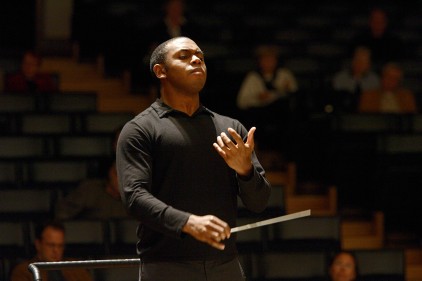Young conductor takes a low-key approach to life and music

Last fall at the Harris Theater, the young American conductor Kazem Abdullah led a group of Brazilians through rehearsal like a stoic military general.
“We need a much bigger diminuendo,” he said calmly, barely audible from even the second row. Moments later he broke into fragmented Portuguese and all the string players from the Orquestra de Sao Paulo smiled widely back at him. Running out of vocabulary, he coolly switched back to English. “Now, experiment with the slow movement so you almost can’t hear yourself,” he suggested during Bartok’s Miraculous Mandarin.
Abdullah’s rehearsal style is similar to the way he gives interviews. He’s meticulously detailed, at times taciturn, even monosyllabic, and low on exuberance and hubris. Which is pretty unusual given that so many “young rising stars,” as he is now regularly called these days, embrace the spotlight and milk their publicity opportunities for all their worth.
Not this soft-spoken 30-year-old from Dayton, Ohio. It should be interesting then to see this young musician take on the gargantuan Beethoven Ninth Symphony next week with the Chicago Sinfonietta. It will be his first appearance with Chicago’s “most diverse orchestra” and also his first public performance of the symphony.
Abdullah was quick to call it an “original and complex masterpiece,” but after a little prodding wasn’t willing to divulge any influences. “There are no recordings I model myself after,” he says matter-of-factly when asked what performances of the symphony have shaped his own ideas. “In fact,” he adds, “I really don’t listen to recordings to get interpretations.”
Instead, he approached it like every other piece he studies, which is slow and carefully to absorb all the details of musical content. He does cite one interesting influence, though. He listens to Beethoven’s contemporaneous late string quartets for further insight into the Ninth.
As a gifted clarinetist too, Abdullah is a regular performer of chamber music. He’s soloed with the Cincinnati Orchestra, National Symphony and the New World Symphony under Michael Tilson Thomas.
Conducting, however, is his passion and since 2006 he has enjoyed working as an assistant and cover conductor with the Metropolitan Opera.
“Opera has always been a very important art form to me,” he said. “All great conductors have some involvement in both symphonic and operatic music. As for composers, when they write for instrumentalists they often have the human voice in min.” Last January he successfully conducted a Met revival of Gluck’s Orfeo ed Euridice, replacing an ailing James Levine. This March in Paris he will be conducting a new production of Scott Joplin’s rarely staged Treemonisha.
Eclectic music certainly figures prominently in Abdullah’s portfolio. Conducting the Orquestra de Sao Paulo last year, he negotiated between works of Bartok, Villa Lobos, Albert Nepomuceno and James MacMillan. But to hear it from his mouth, his loves are of a more household variety than that.
“I really love the core Germanic Classical and Romantic repertoire—Brahms, Wagner, Mozart and Beethoven. And I also love 20th century music, particularly the Second Viennese School,” he says, adding he also closely follows the music of John Adams, Elliott Carter and Charles Wuorinen.
His musical education began modestly enough while at public school in Dayton. At age 10 he was allowed to pick out an instrument and chose clarinet and piano. He was good enough to play in the Cincinnati Orchestra as a high school student and to later study under notable clarinetist Ron de Kant at the Cincinnati Conservatory. He then headed west to southern California to study at USC, and, after graduation, spent three years with the New World Symphony under Tilson Thomas in Miami Beach.
Now living in New York, the Indiana-born maestro seems primed to assume a regular post somewhere. The Chicago Sinfonietta, which promotes musicians of color, could be a great place as the area’s musical resources are as vast as anywhere. As they conduct an ongoing search to replace founding music director Paul Freeman, there is the assumption Abdullah will be publically auditioning for the job. Has he thought about it?
“I’m sorry, but I can only focus on this project now,” he explained, without a trace of the stutter he is known to carry. “I really want to make this a great performance.”
Maybe his Ninth won’t be so stoic after all.
Kazem Abdullah leads the Chicago Sinfonietta, soloists and Northwestern University Chorus in Beethoven’s Symphony No. 9 at 8 p.m. Jan. 16 at North Central College in Naperville; 2:30 p.m. Jan. 17 at Dominican University in River Forest; and 7:30 p.m. Jan. 18 at Symphony Center. www.chicagosinfonietta.org; 312-236-3681
Posted in Articles




